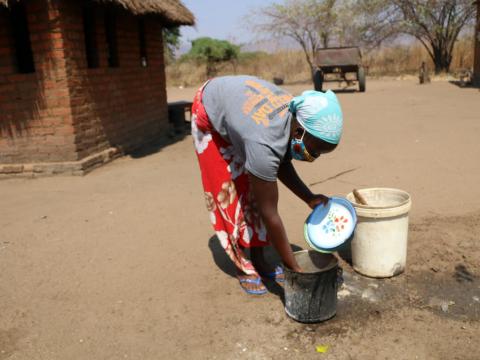Parental support and child marriage in Zimbabwe

By Munyaradzi T. Nkomo and Shamiso Matambanadzo, World Vision Zimbabwe
17-year-old Thulie was not pregnant and was still in school when she decided to get married at the age of 15. Her parents didn’t arrange anything for her either – her father died when she was young and when her mum remarried she was sent to live with her maternal grandparents who did their best to take care of her and pay her school fees. What got her, she says, is hunger and the constant bullying by her uncles.
“Some days they would find me eating a meal and would take the plate from me. They would beat me for no reason.”
Her boyfriend at the time was an orphan, and they decided they could take better care of themselves. Now 17, Thulie has a daughter of her own, and while she doesn’t regret her decision, she’s adamant her daughter will finish her education.
“I would not want my daughter to get married early, NO, I want her to be a nurse so she can also look after me in my old age!”
Never Zaina, an Education Facilitator with World Vision in Zimbabwe, says child marriages in the area were high even before the COVID-19 pandemic. According to the last nationwide survey in 2019, about 1 in 3 young women in Zimbabwe are married before the age of 18. Crispen Ndiridza, a community child worker, explains that culture, religious beliefs and poverty are the reason why young girls are being married off to older men.
Ree, 25, lives in the same community and got married after dropping out of school at age 16. In a similar story to Thulie, her parents separated when she was a baby and her mother remarried and left her with her elderly grandparents. They struggled to support her as they were too old to work. Ree was taken to school through a donor program until she got to the end of her primary school. Her uncle offered to take her to high school but when he neglected to pay her fees, she was forced to drop out. Life with her grandparents was hard and sometimes they would go for days without meals.
Ree decided to get married and move in with her boyfriend who had also been orphaned and was struggling to support his four younger siblings. Although Zimbabwe has recently prohibited practices that previously barred pregnant girls and young mothers from continuing their educations, Ree, now a mother in her own right, has struggled to pay her own school fees on top of all the children when she has tried to go back to school between births.
“Life is hard without an education,” she says, when asked if she would allow her own daughter to get married early. “I would refuse and encourage her to go to school.”
World Vision's recent report COVID-19 and child marriage: How COVID-19's impact on hunger and education is forcing children into marriage examines the ways in which hunger, access to education, poverty, parental support and general well-being are all linked to child marriage. Our data analysis found that as caregiver support and encouragement increases, it significantly decreases the likelihood of an adolescent being married. Stories like Thulie and Ree's help demonstrate just why a cross-sectoral approach to ending child marriage is so necessary.